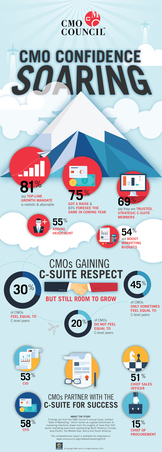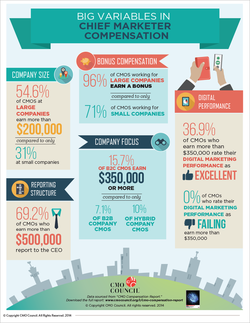The last year has shown a significant increase in the analysts’ focus on the CMO role and how marketing is changing at an unprecedented pace due to influences from digital, proliferation of channels, big data, customer insight and more. This change will only increase going forward but brings with it a unique opportunity for the CMO and marketing to make significantly more impact on the business strategy and success.
Gartner says “no longer seen as the promotional chief or chairman of arts and crafts, the CMO is now expected to drive strategic growth for the business. This candidate knows brands, products, markets and customers. Often, they’re expected to monetize engagement via digital commerce. The challenge for this candidate is proving they can run predictable business. That begins, of course, with running marketing itself like a predictable business – not a house of cards and certainly not a hall of mirrors.”
Recent research from the CMO Council confirms that the CMO is certainly gaining C-suite respect. CMO confidence is soaring, but there is still room for growth:
Gartner says “no longer seen as the promotional chief or chairman of arts and crafts, the CMO is now expected to drive strategic growth for the business. This candidate knows brands, products, markets and customers. Often, they’re expected to monetize engagement via digital commerce. The challenge for this candidate is proving they can run predictable business. That begins, of course, with running marketing itself like a predictable business – not a house of cards and certainly not a hall of mirrors.”
Recent research from the CMO Council confirms that the CMO is certainly gaining C-suite respect. CMO confidence is soaring, but there is still room for growth:
| It is perhaps interesting, in this context, to look at some of the findings from the recent Adobe CMO Research “Digital Roadblock: Marketers struggle to reinvent themselves”. Whilst the CMO is gaining C-suite respect there are still significant challenges to be addressed and dealt with to ensure a future-proof and fit for purpose marketing organisation:
|
| How CMOs deal with these challenges will have direct impact on their success and recognition. The CMO Council’s research shows that there are big variables in the CMO’s compensation with 36.9% of CMOs who earn more than $350,000 rating their digital marketing performance as excellent; whilst 0% of CMO’s who report their digital marketing as failing earns more than $350,000. There is no doubt that there are big opportunities ahead for the CMOs who are able to make the necessary transition and build the right marketing organisation. |
It is also interesting to note that whilst the four biggest challenges for CMOs are almost unanimously identified by all analysts as the explosion of data, social media, the proliferation of channels and shifting customer demographics, a recent study from IBM claim that 80% of CMOs are uncomfortable with Big Data. No wonder Harvard Business Review names Data Scientist “the sexiest job of the 21st century”. Data Scientists are in notoriously high demand, hard to attract and command large salaries.


 RSS Feed
RSS Feed